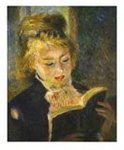 Wild Swans:
Wild Swans:Three Daughters of China
by Jung Chang
1992, 508 pp.
Rating: 4.5
1994 British Book of the Year
This is a long, fascinating book that I'm really glad I finished. I got this after reading Snow Flower and the Secret Fan, which I absolutely loved. I didn't know it was non-fiction until it came in the mail. I saw that it was a banned book, so I used it for the Banned Book Challenge as well as the Chunkster Challenge.
The book tells the life stories of Jung and her mother and grandmother. Along the way I learned quite a bit about China under Mao as well. I love history when it is presented this way. I've always felt that history was more about how people's lives were affected by their rulers than just names, dates, and events that occurred.
The book is told chronologically. The first story is about how Jung's grandmother had no choice in being a concubine to a Chinese general. The "marriage" was arranged so that her grandmother's father would have more privileges of his own. Jung's mother was born from this union.
Next, we learn of her mother's life growing up under Japanese occupation in Manchuria, and then after the Japanese surrender, the fight between the Kuomintang and the Communists for power in China. Jung's parents become Communist officials who very much believe in the Communist ideals. Their "faith" is eventually shattered by Mao's thirst for power and his "Cultural Revolution."
Although her parents were still receiving their salaries from the government, they were also being detained or being made to go to denunciation meetings where they were yelled at and/or beaten. The Red Guard and the Rebels were encouraged to rise up against the old Communist officials and take control. Even young children were encouraged to beat up their teachers. School days consisted of reading Mao's works, punishing anyone who was a "class enemy", and tearing up the grass and flowers in the courtyards as they were too "decadent."
As Jung grows up, she is at first enamored with Mao, but is eventually disillusioned with what has happened to her family and to herself. She is a bright young woman who is required several times to be "reeducated" by the peasants or factory workers. After Mao dies, eventually China changes for the better. She is able to go to the West and study, but she never permanently returns to China.
I highly recommend this book if you are interested in history in general or Chinese culture. It is also a "wake-up" call to us softies in the West. Books like these really make me appreciate American freedom!




9 comments:
I love history when it is presented this way. I've always felt that history was more about how people's lives were affected by their rulers than just names, dates, and events that occurred.
I completely agree!! This book sounds awesome. Thanks for the review. I'll look this one up.
This book looks awesome, I've added it to my never ending TBR!
Teddy
i have this book on my Book Awards Reading Challenge List, and i'm looking forward to it! have you read Life and Death in Shanghai?
That sounds interesting, thanks for the review
got this on the shelf next to me waiting to be read. If you think I should read it next, visit Arukiyomi and vote for it!
Great to red your review as an appetizer!
I enjoyed this book as well although I always thought it was a historical fiction. Either way, it was a compelling story.
Sorry, got my books mixed up. I was talking about Snowflower, but I'm looking forward to reading Swans soon.
I have this book on my list to read and am really looking forward to it. I don't know anything really about Chinese history so should be an interesting eye-opener.
An absolutly amazingly crafted book, which captivates and holds the readers intrest. Showing the impact a leader can have on peoples lives.
Post a Comment